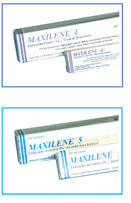Maxilene 5 30g
MAXILENE
What is MAXILENE?
MAXILENE is a brand name for a topical cream that contains an anesthetic called lidocaine in a non-prescription strength.
What is lidocaine used for?
MAXILENE 4 (lidocaine) and MAXILENE 5 (lidocaine) can relieve the pain and/or itching associated with minor burns, sunburn, minor cuts, scrapes, insect bites or minor skin irritations. MAXILENE 5 (lidocaine) can help relieve the discomfort and/or itching associated with hemorrhoids, anorectal disorders, inflamed hemorrhoidal tissues, anorectal inflammation, hemorrhoidal tissues or piles.
How does MAXILENE work?
Lidocaine causes a loss of feeling in the skin and surrounding tissues. Maxilene contains tiny microscopic, multi-layered spheres called Accusomes™. Once the lidocaine reaches the nerve endings, you may notice a slight cooling sensation, followed by an increased numbing feeling in the area covered by the cream. Areas of skin not directly covered by the cream will not be affected.
Although it is not necessary to cover the area after application of MAXILENE, it is recommended when using on young children to prevent accidental ingestion or removal of the cream. A clear plastic wrap can be used to occlude the area.
What's in MAXILENE?
MAXILENE is available in a 4% and 5% concentration of lidocaine. It also contains benzyl alcohol, carbomer 940, cholesterol, hydrogenated lecithin, isopropyl myristate, polysorbate 80, propylene glycol, trolamine, vitamin E acetate, and water.
If you think that you or your child might be sensitive to any of the components of MAXILENE, check with your doctor or pharmacist before using this medication.
How do I use MAXILENE in children?
Topical use: Children under 2 years of age: consult a physician.
What precautions should I take when using MAXILENE?
MAXILENE should only be used externally. If condition worsens or if symptoms persist for more than 7 days, or clear up and occur again within a few days, discontinue use and consult a doctor. Be careful to avoid injury to the treated area while it is numb and you are not feeling pain.
Do not put MAXILENE into your mouth or nose. If swallowed, get medical help or contact a Poison Control Centre right away. Be careful not to get any of this medication into your eyes. If this medication gets into your eyes, immediately wash out the eye with water and protect the eye until sensation returns. Check with your doctor. Do not use MAXILENE inside the ear.
Topical use: FOR EXTERNAL USE ONLY.
Do not use in large quantities, particularly over raw surfaces or blistered areas. Application of MAXILENE cream to larger areas or for longer times than those recommended could result in sufficient absorption of lidocaine to cause serious adverse effects.
Are there any side effects associated with using MAXILENE?
Although uncommon, side effects may occur. The most common side effects are irritation, redness, itching, or rash. Although these side effects usually do not require medical attention, if they continue or are bothersome, report them to your doctor or health care professional. If you notice any unusual effects such as blurred vision, dizziness or drowsiness, difficulty breathing, trembling, chest pain or irregular heartbeat, contact your doctor or health care professional immediately.
